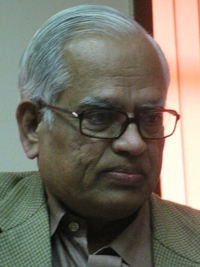ISJS
Series of 3 seminars on
Integrating Modern Science and Spirituality for Social Wellness:
A Challenge of 21st Century
Seminar "A"
Consciousness and Knowledge: Scientific and Spiritual Perspectives
Delhi
Sundday, December 12, 2010
Session V: 11.30-12.00
Abstract
Science and Religion are Two Different Pathways to Truth
All knowledge is anthropogenic. While all living organisms have consciousness of some degree, man is the only species who has self-consciousness. Every civilization has put up men who asked questions about nature, life, and values etc. Philosophers have asked questions regarding the TRUTH. There are many roads to arriving at TRUTH. Religions of the world have spoken about their discoveries of exclusive road to TRUTH. The latest contender in this is modern science. Modern science is less than five hundred years old. Post-renaissance Western Europe gave rise to modern science. Through colonial rule it spread to other countries. The characteristic feature of modern science distinct from all other approaches to TRUTH is the scientific method.
This simply means the truth has to be experienced by others also without exception. Scientific method mainly includes deductive logic and inductive reasoning. Rational thinking is the bedrock on which science rests. Scientific method surprisingly includes a provision for falsification of its assertions. Religious approaches are based on faith and many times on dogma. In practice too, many times cultural traditions are confused with religious practices. While most religions talk about the nature of TRUTH, Buddhism and Jainism show the way to arriving at TRUTH but do not reveal the TRUTH itself. Every individual has to realize truth by himself/herself. That implies that truth can differ from individual to individual. Science does not lay claim to exclusivity to know the truth. Scientific results can be experienced only if experiments are carried out under controlled conditions. That is the bane of science. Science restricts itself to understanding the structure and functioning of nature. All other questions about other human experiences or ideas are not discussed as no experiments can be done and no measurement is possible. Science depends on only one experiment i.e. measurement. Science does not deal with anything that is not measurable. Many areas of human experience are therefore not discussed in science.
Methods of religion like exclusive revelation, intuition, dreams, word of the self-styled authority and hallucinations are not permitted officially in science. In practice however there are aberrations in science. But the aberrations are encountered in average science otherwise called middle class science or normal science. It is also true that normal science does not need creativity but only intelligence. Most of the normal scientists have a problem to solve and that requires intelligence and not creativity.
Technology development on the other hand requires innovation, imagination and a high degree of creativity. Intelligence arises through conscious thinking while creativity is a result of sub-conscious thinking. Nobody understands the mechanism of even conscious thinking through a language not to speak of subconscious mind. Hence some western philosophers have questioned the validity of western philosophical assertions as they say until man understands how brain functions and the cognitive mechanisms are unraveled, all human knowledge is not valid. Hence both science and philosophy/religion have limitations.
Photos


 Prof. K. Murlidhar
Prof. K. Murlidhar